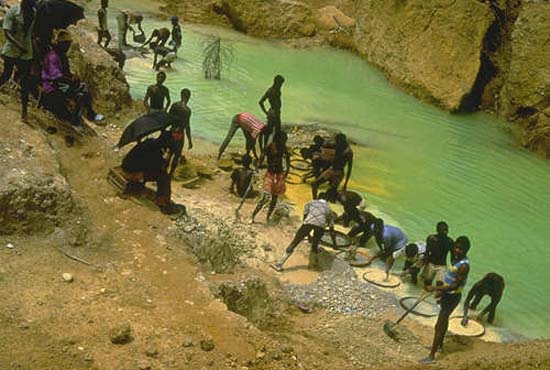
Thomas N. Hull III, US Ambassador to Sierra Leone, who first went to Sierra Leone as a Peace Corps volunteer nearly 36 years ago says Democracy "Taking Root" in Sierra Leone Amid Fragile Peace
Democracy "Taking Root" in Sierra Leone Amid Fragile Peace
United States Department of State (Washington, DC)
May 3, 2004
Posted to the web May 4, 2004
Charles W. Corey
Washington, DC
In the aftermath of Sierra Leone's brutal civil war, "considerable progress" has been made toward consolidating peace with the help of the international community, but that "peace is fragile," warned Thomas N. Hull III, the U.S. ambassador-designate to that country.
In testimony before the U.S. Senate Foreign Relations Committee April 28, Hull listed the difficulties Sierra Leone faced and how the United States was helping and would continue to help the country find its political and economic feet.
Politically, he asserted, "democracy is taking root in Sierra Leone," with local elections to be held in May, adding that "the United States will provide training to district and town councils as newly elected officials take up their responsibilities."
But, Hull told the lawmakers, the greatest threat to democracy in the country is corruption, and he pledged, "If confirmed, I will not only nurture democracy but will firmly urge leaders to actively support Sierra Leone's anti-corruption commission."
Citing 2003 statistics from the United Nations, Hull told the committee that Sierra Leone ranks as the world's least developed country. "To boost the economy and provide for basic human needs," Hull pledged to focus on U.S. Agency for International Development (USAID) assistance on agricultural development to increase employment and to produce food and cash crops.
Hull also pledged to "direct U.S. assistance to support the [Sierra Leone] government's efforts to exploit its diamond resources in a more transparent fashion and in accordance with the Kimberley Process and in a manner that will generate revenues in diamond-producing areas to stimulate economic growth."
Additionally, Hull pledged to "foster private sector development through micro-enterprise programs and trade incentives such as AGOA [the African Growth and Opportunity Act] and to advocate for U.S. business interests."
Hull, a career diplomat and Africa specialist, added: "HIV/AIDS poses a tragic threat to Sierra Leone's future. The United States has financed an innovative AIDS awareness program in the Sierra Leone armed forces," and as part of that program, specialists from the U.S. Centers for Disease Control regularly advise the Sierra Leone government on combating AIDS.
Hull told the lawmakers that he first went to Sierra Leone as a Peace Corps volunteer nearly 36 years ago and has since held seven Foreign Service assignments in Africa and served as director of African affairs at the former U.S. Information Agency.
Asked to elaborate on the corruption factor in Sierra Leone, Hull said, "Corruption threatens to undermine everything else that we want to achieve in Sierra Leone," calling it a "cancer on democracy" that must be attacked at the root. "You have to go where the resources are, and the resources that are fueling corruption in Sierra Leone are the diamonds."
For that reason, Hull pledged to "pay a lot of attention" to the U.S. initiatives that try to control and regulate the export of diamonds from Sierra Leone. Even though progress is being made in that area, he said, there is still more than $100 million a year in diamonds being exported illegally. "That money is clearly fueling corruption in the country," he said.
Asked if the Special Court for Sierra Leone can be effective while former Liberian President Charles Taylor remains in Nigeria, Hull said: "We [the United States government] are ... supporters of the Special Court. We hope they will begin their first trials soon. We would like Charles Taylor to make a visit to Freetown and appear before the court. He certainly should be held accountable for any war crimes that he may have committed."
Hull said he understands that an "active dialogue" is under way among the U.S. State Department, the U.S. Embassy in Abuja and the Nigerian government to try to get Taylor to travel to Sierra Leone.
Asked what can be done to improve the situation of women and girls in Sierra Leone, Hull said a number of steps could be taken. "Women and girls need more education. ... Harmful traditional practices like female genital mutilation need to be addressed." Hull said that working through the very effective nongovernmental organizations (NGOs) in Sierra Leone that are operated by women is the best way to address many of those kinds of problems.
(The Washington File is a product of the Bureau of International Information Programs, U.S. Department of State. Web site: http://usinfo.state.gov)
